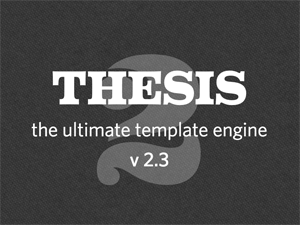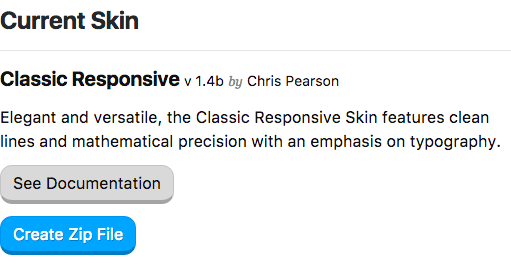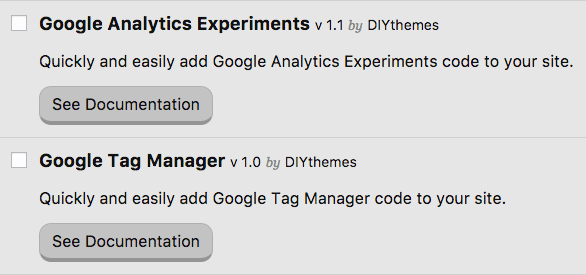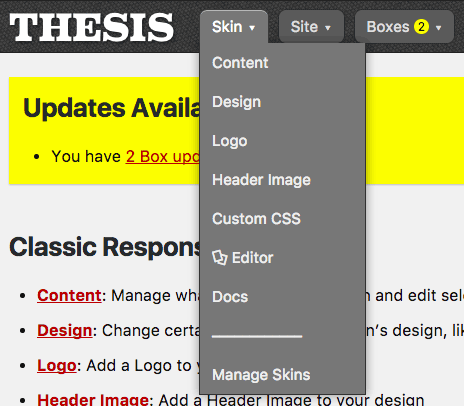
With each passing day, the future of your website depends more and more on two things—speed and integrations.
As you know, Thesis has always had you covered on the speed side of things. Version 2.3 brings you even better performance on both the front end and the admin side, so your site will be faster and more efficient than ever before.
But integrations? What does that even mean?
It’s simple. One piece of software—no matter how good—is not going to serve all your needs. To achieve your website goals, you’re likely going to need to integrate at least two pieces of software (and probably more) to get everything working the way you want.
For example, the DIYthemes website relies on no fewer than 4 different software integrations…and take it from me, it can be a real pain to keep up with this stuff over a long period of time!
This is a big reason why we’ve decided to refocus our development efforts on enhancing software integrations with Thesis.
First up? A best-in-class WooCommerce integration in Thesis 2.3, and there’s a bonus—this integration will automatically work with any Thesis Skin!
In other words, if your site didn’t “just work” with WooCommerce before, it will now! Read on for the juicy details.
Extremely Detailed WooCommerce Integration
I’m generally against putting code in the Thesis core that exists only to enhance compatibility with a specific piece of Third Party software, so that’s why we haven’t seen a major WooCommerce integration before now. (And technically, Boxes are supposed to serve this purpose.)
But let’s face it—WooCommerce is huge because being able to sell products quickly and easily from your website is a big, big deal. On top of that, Thesis users were experiencing frustrating obstacles when trying to use even basic WooCommerce features on their sites.
I finally decided it was time to build the ultimate WooCommerce integration into Thesis, so that’s precisely what I did.
Version 2.3 declares WooCommerce support and sets up your templates to work properly regardless of the Skin you’re using, but that’s only the beginning.
As many of you probably already know, WooCommerce is brutally inefficient and slow. Simply activating the WooCommerce Plugin will slow down every page of your site with lots of scripts and stylesheets—regardless of whether or not a particular page needs or uses WooCommerce at all!
Unacceptable. A ham-fisted, inefficient approach like this just isn’t the “Thesis way.”
This is why Thesis 2.3 also includes automatic WooCommerce optimization. Only pages of your site that need WooCommerce will include the necessary scripts and stylesheets; the rest of your pages will be just as fast and efficient as if you weren’t even using the Plugin!
Now that is the Thesis way.
Thesis Skins and Enhanced WooCommerce Support
Of course, I couldn’t just stop with basic WooCommerce integration. I also wanted to make it easy for Skin developers to add enhanced WooCommerce support to their Skins. Here’s why that matters:
Every Skin is different, which means every WooCommerce integration is going to be different, too. Thesis does the heavy lifting here, but Skins can still improve the WooCommerce experience by making specific adjustments to both templates and CSS.
With Thesis 2.3, template adjustments are easy with the new woocommerce() method in the Skin API.
CSS adjustments are easy, too, and developers can get insight on this as well as every other detail of the integration process with our WooCommerce compatibility guide.
Need WooCommerce compatibility right away? (Classic Responsive 1.4 Update)
If you want the full WooCommerce compatibility experience right away, all you need to do is grab the Classic Responsive Skin version 1.4 update.
After updating the Classic Responsive Skin, you’ll need to:
- Update your Skin CSS
- Save your Design options
…and your site will deliver the ultimate WooCommerce experience.
Oh, and one important note: With Thesis 2.3, WooCommerce’s native product and product archive pages are fully configurable in terms of content (archive title, archive description), SEO data (title tag, meta tags, and more), and template.
In other words, Thesis gives you a level of control that will enable you to create the most optimized product pages on the planet.
And with Classic Responsive version 1.4, you can take advantage of this immediately.
New Documentation Links
I know you guys and gals will appreciate this new feature! As of version 2.3, Skins and Boxes can now provide a link to associated documentation, and Thesis will include these links in helpful locations within the Thesis Admin.
For example, you’ll see this documentation link after updating to Classic Responsive 1.4:

And here’s what Box documentation links look like (along with a hint or two about some more good stuff we’ve got for you):

Let’s just take a deep breath and savor this one for a moment.
Mmmmm. So helpful. So good.
Ok, moving on…
Expert Security Audit
Thesis user and security expert Jay Dansand performed an audit on the software and provided us with a list of recommendations to improve security and harden potential vulnerabilities.
Needless to say, we implemented his recommendations! Also, I must say that I am personally grateful to Jay because I learned a few things from him throughout this process.
Caching Detection (or how we solved our #1 support request)
- “My design options don’t work!”
- “My Custom CSS isn’t working!”
- “I can’t make any changes with Thesis!”
Nine times out of ten, the above problems are caused by the use of a caching Plugin like W3 Total Cache or WP Super Cache. I tell ya—it’s enough to drive a man insane.
But one day, it hit me: What if, instead of going insane, I just solved this problem with some simple code?
Thanks to this brilliant insight, Thesis 2.3 will detect if you’re using a caching Plugin, and it’ll notify you of potential issues and give you a link to these instructions on what to do.
A solution so simple, it’s no wonder I didn’t think of it sooner.
Improved WP-CLI Compatibility
Lots of “managed WordPress hosts” are now using WP-CLI to handle server-level WordPress actions, and this was causing various issues with prior versions of Thesis.
I worked with a couple of these hosts to troubleshoot and resolve these issues, and ultimately, this resulted in a modified Thesis launch sequence with improved component timing.
Or to put it another way:
Thesis is like the conductor of an orchestra, and it must call upon its components (instruments) at precisely the right time, or else the music just won’t make any sense 😀
Click-to-reveal on Thesis Admin Menus
I’ve never really been a fan of the hover-to-reveal behavior that has characterized dropdown navigation menus since the dawn of time (or 2005, whichever was first).
Let’s face it—the unintentional hover that results in a menu covering precisely the item you intended to click gets pretty old after the 1000th time.
Well, never again, because the Thesis Admin menu items are now all click-to-reveal:

Another notable point about this change is that devices with touch interfaces don’t have an equivalent hover behavior. From the perspective of consistency across devices, this move really makes sense.
Can you touch the top of your <head>?
With prior versions of Thesis, if you needed to put something at the top of your document <head>, you had to do some pretty interesting code gymnastics to make it happen.
There are plenty of reasons why this spot in the HTML document needs to be readily accessible, and that’s why Thesis 2.3 includes a new hook—hook_head_top—in this location.
We’re going to be using this hook to bring you hassle-free integrations for both Google Tag Manager and Google Analytics Experiments, so stay tuned for those in the coming days!
More Speed! (It’s kind of my thing.)
While squashing a couple of Thesis Admin bugs, I happened to lose myself down a performance and optimization rabbit hole. By the time I came out, I had improved Thesis’ resource usage and curtailed unnecessary actions wherever possible.
The result? Both your front end and your admin side will run faster and more efficiently with Thesis 2.3.
But wait, there’s more!
From updated Google Fonts to System Status enhancements and various bug fixes, there’s a lot of good stuff in this Thesis update. Have a look at the version 2.3 changelog for all the gory details!
